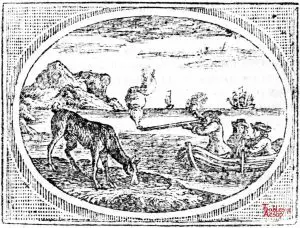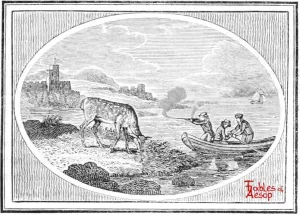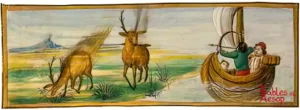A doe with one eye thought she was safe eating while looking shoreward but then missed the archer in the boat. Oh my!
You cannot escape your fate.

Eliot/Jacobs Version
A Doe had had the misfortune to lose one of her eyes, and could not see any one approaching her on that side. So to avoid any danger she always used to feed on a high cliff near the sea, with her sound eye looking towards the land. By this means she could see whenever the hunters approached her on land, and often escaped by this means. But the hunters found out that she was blind of one eye, and hiring a boat rowed under the cliff where she used to feed and shot her from the sea. “Ah,” cried she with her dying voice, “You cannot escape your fate.”

Townsend version
A doe blind in one eye was accustomed to graze as near to the edge of the cliff as she possibly could, in the hope of securing her greater safety. She turned her sound eye towards the land that she might get the earliest tidings of the approach of hunter or hound, and her injured eye towards the sea, from whence she entertained no anticipation of danger. Some boatmen sailing by saw her, and taking a successful aim, mortally wounded her. Yielding up her last breath, she gasped forth this lament: “O wretched creature that I am! to take such precaution against the land, and after all to find this seashore, to which I had come for safety, so much more perilous.”

Samuel Croxall
A DOE, that had but one eye, used to graze near the sea, and that she might be the more secure from harm, she kept her blind side towards the water, from whence she had no apprehension of danger, and with the other surveyed the country as she fed. By this vigilance and precaution she thought herself in the utmost security; when a sly fellow, with two or three of his companions, who had been poaching after her several days to no purpose, at last took a boat and fetching a compass upon the sea, came gently down upon her, and shot her. The Doe, in the agonies of death, breathed out this doleful complaint: O hard fate! that I should receive my death’s wound from that side whence I expected no ill; and be safe in that part where I looked for the most danger.
THE APPLICATION
Life is so full of accidents and uncertainties, that, with all the precaution we use, we can never be said to be entirely free from danger. And though there is but one way for us to come into the world, the passages to let us out of it are innumerable. So that we may guard ourselves against the most visible and threatening ills as much as we please, but shall still leave an unguarded side to a thousand latent mischiefs, which lie in ambush round about us. The moral, therefore, which such a reflection suggests to us, is to be neither too secure, nor too solicitous about the safety of our persons; as it is impossible for us to be always out of danger, so would it be unreasonable and unmanly to be always in fear of that which it is not in our power to prevent.

Thomas Bewick (The One-Eyed Doe)
A Doe that had lost an eye, used to graze near the sea; and that she might be the more secure from harm, she kept her blind side towards the water, from whence she had no apprehension of danger, and with the other surveyed the country as she fed. By this vigilance and precaution, she thought herself in the utmost security; but a sly fellow, with two poaching companions, who had watched her several days to no purpose, at last took a boat, and came gently down upon her, and shot her. The Doe, in the agonies of death, breathed out this doleful complaint: O hard fate, that I should receive my death’s wound from the side whence I expected no ill, and be safe in that quarter where I looked for the most danger.
APPLICATION.
We are liable to many misfortunes that no care or foresight can prevent; but we ought to provide in the best way we can against them, and leave the rest to Providence. The wisest of men have their foibles or blind sides, and have their enemies too, who watch to take advantage of their weaknesses. It behoves us therefore to look to ourselves on the blind side, as the part that lies most exposed to an attack. Vigilance and caution are commonly our best preservatives from evil, and security is often a fatal enemy, when we cherish it so as to lull all our apprehensions to rest. We should not however encourage in ourselves the slavish principle of fear, nor make ourselves miserable on account of latent evils, which it is not in our power to prevent. The ways and workings of Providence are inscrutable; and it is not in the power of human prudence to obviate all the accidents of life.
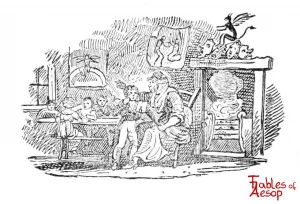

JBR Collection
A Doe that had but one eye, used to graze near the sea, so that she might keep her blind eye towards the water, while she surveyed the country and saw that no hunters came ncar, with the other. It happened, however, that some men in a boat saw her, and as she did not perceive their approach, they came very close, and one who had a gun, fired and shot her. In her dying agony she cried out, “Alas, hard fate! that I should receive my death-wound from the side whence I expected no ill, and be safe on that where I looked for most danger.”

L’Estrange version (A Stag With One Eye)
A one-eyed-stag that was affraid of the huntsmen at land, kept a watch that way with t’other eye, and fed with his blind side still toward an arm of the sea, where he thought there was no danger. In this prospect of security, he was struck with an arrow from a boat, and so ended his days with this lamentation: Here am I destroy’d, says he, where I reckon’d my self to be safe on the one hand; and no evil has befal’n me, where I most dreaded it, on the other.
Moral
We are lyable to many unlucky accidents that no care or foresight can prevent: but we are to provide however the best we can against them, and leave the rest to providence.

Crane Poetry Visual
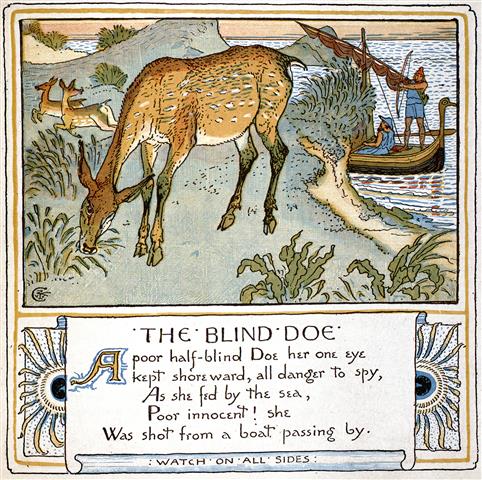
A poor half-blind Doe her one eye
Kept shoreward, all danger to spy,
As she fed by the sea,
Poor innocent! She
Was shot from a boat passing by.
Watch on all sides.

Gherardo Image from 1480

Cervus Oculo Captus
Cervus, altero oculo captus, iuxta mare pasci consueverat ita ut integrum oculum in terram haberet versum; nihil enim periculi videbatur e mari impendere. Cum autem forte navis praeterveheretur, qui in illa erant, directa in cervum sagitta, incautum confixere. Ille ictus, “Me miserum,” inquit, “quantopere deceptus fui, qui a terra metui, undis fretus, e quibus mihi mors immittitur.”
Perry #075
